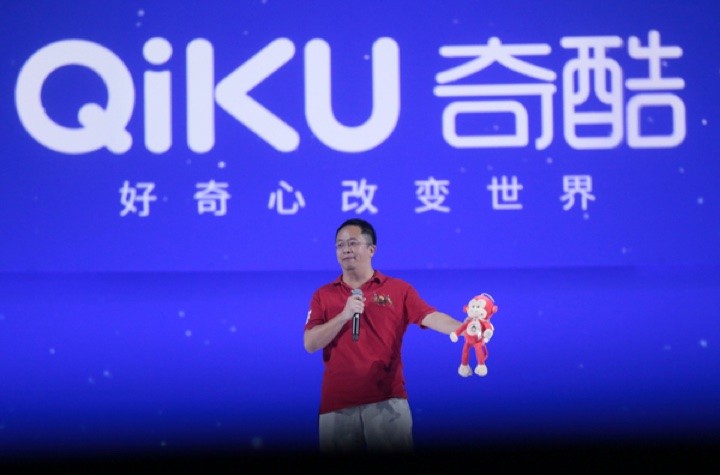
Qihoo CEO Zhou Hongyi at an event for his smartphone subsidiary Qiku.
It was Albert Einstein (supposedly) who said that insanity is doing the same thing over and over again, expecting a different result.
By that definition, Qihoo 360 CEO Zhou Hongyi is insane.
Welcome to crazytownYou may not have heard of Qihoo 360, but it's actually one of China's largest internet companies, just a rung below Baidu, Alibaba, and Tencent. It's primarily an antivirus and security company, but CEO and founder Zhou Hongyi has been trying to branch out for years. Qihoo has flirted with everything from social media to search engines, achieving some traction but little sustained success. It's clear, however, that Zhou's real Holy Grail is the smartphone.
Just last week, Qihoo revealed that it has acquired smartphone maker Blephone in the hopes that 2017 will finally be the year of the Qihoo smartphone. On its face, it seems like a dubious claim. For one thing, nobody has ever heard of Blephone, so it's hard to see how that company is going to turn Qihoo's smartphone fortune around. But it's also hard to ignore the reality: Qihoo has been trying to get a foothold in China's smartphone market for years, sometimes with help from much more respected partners, and it has failed every single time.
In 2012, probably inspired by the success of an ascendant Xiaomi, Qihoo began trying to get into the smartphone game by partnering with Chinese OEMs to make Qihoo-branded phones. That year, it released phones from Huawei and Haier, but ultimately neither of those caught on. By 2013, both partnerships had dried up.

Qihoo's "Battleship" smartphone, made with Haier.
In late 2014, Qihoo took another swing for the fences, investing big in a joint-venture with Chinese smartphone maker Coolpad. At the time, Zhou was convinced that it wasn't too late for Qihoo to enter the smartphone game, but the market had other ideas. Qihoo got into a spat with Coolpad over an outside investment from upstart phone-maker LeEco (then called Letv), and although the issue was eventually settled, the joint-venture's "Qiku" brand phones fell flat.
At around the same time, Qihoo also developed its own Android-based smartphone OS called 360OS. That's still around (it'll be used in the phones Qihoo releases with Blephone), but it has failed to grab up any significant market share. Neither have any of the self-made smartphones Qihoo has released in addition to the partner-made phones described above.
So, 2012 wasn't the year of the Qihoo smartphone. Neither was 2013, 2014, 2015, or 2016. I don't have a crystal ball, but the outlook for Qihoo's smartphone plans in 2017 don't look good, especially considering that Blephone is a far less accomplished partner than Coolpad, Huawei, or Haier.
So wait, is Zhou Hongyi actually crazy, then?He's certainly been called that. In fact, his own partner Coolpad accused him of acting like "an emperor who howls crazily" in an open letter sent to him during the dispute between the two companies.
But in fact, Zhou probably knows his company missed the boat. It's not clear why he refuses to let the idea go, but he knew it was already quite late to get into China's smartphone market back in 2015. Back then, he told Forbes China that Qihoo had already missed the best opportunity to get into the smartphone game, which was back in 2012. But, he said, Qihoo has to get into the smartphone game because:
Will something new disrupt the smartphone? If you're not making smartphones, you'll never know the answer to that question. You'll always be an outsider.
Two years later, Qihoo's still on the outside looking in. And despite a new plan to get into the smartphone game, it seems highly unlikely that this time, Qihoo will somehow fight its way to a serious share of the market.
Qihoo is doing the same thing it's been doing for the past five years, but expecting a different result. It won't get one.
This is an opinion piece.
Source: The Chinese tech giant whose smartphones flopped over and over just won't stop trying
No comments:
Post a Comment